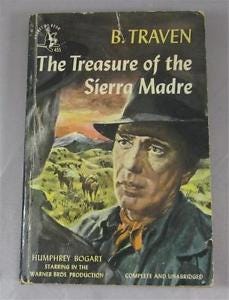Do you know who B. Traven is? I found out only recently, which I suppose is fitting given the man's Pynchon- and Salinger-like desire for obscurity. A while back, I caught the last half-hour of The Treasure of the Sierra Madre, classic celluloid from 1948 starring Humphrey Bogart and John Huston. The Wikipedia article on The Treasure sent me to an entry on B. Traven who wrote the German novel, Der Schatz der Sierra Madre, on which the movie is based. Now you know the rest of the story.
They don't make movies like this any more. HollyWeird liberals don't know how. They'll snow you with meaningless special effects and gratuitous sex and violence in every possible permutation, but they are well-nigh incapable of delivering decent dialog, or stories of human interest, let alone stories that illustrate philosophical themes or raise philosophical or moral questions. The exceptions prove the rule.
One issue raised by The Treasure of the Sierra Madre concerns the status of moral conscience. Is it merely a social construct whose validity evaporates in the wilderness? Or is it a source of trans-cultural moral insight? In one scene, Dobbs, the Bogie character, tells his young partner, Curtin, that he "sounds foolish out in this wilderness" airing his Sunday-School scruples about cheating the old man (the Huston character) of his supplies and gold. Later, after shooting Curtin and leaving him for dead, Dobbs wrestles with his conscience while trying to fall asleep. "If you believe you have a conscience, then it will pester you to death. If you don't believe you have a conscience, what can it do to you?"
The issue, of course, is not whether one believes one has a conscience, for one can believe that one does without believing that conscience is a source of moral knowledge. One might hold that the conscience one has is merely a product of acculturation and that its 'deliverances' don't deliver any objective truths about the moral order, but merely reflect upbringing. The line should go like this, "If you believe conscience is a source of objective moral insight, then it will pester you to death. If you don't believe that it is such a source, what can it do to you?" Unfortunately, screen writers, even back in the '40s didn't write like this. Too philosophical!
There is a nihilistic streak in far too many liberals and leftists which makes them want to pander to the basest instincts in people. So if a HollyWeird liberal were to re-make this film, Dobb's shooting of Curtin would be probably shown in gory detail so as to incite blood lust. In the actual film, the shooting is not shown; only the upshot is: we see a wounded man in the dirt. For only the latter is needed for the story. This was the way things were done until about the time of Sam Peckinpah in the '60s. But the nihilists of the Left are not interested in a human story, they are interested in degrading people in order to line their own pockets. Of course, they will hide behind their right to 'free expression' as if this justified anything and everything.


